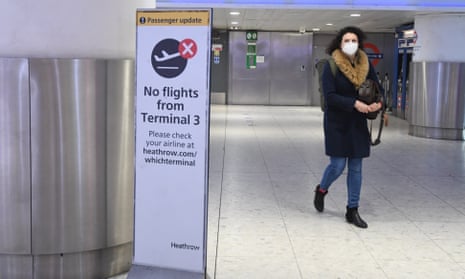An emotional rollercoaster is probably the best way to describe the past few weeks. The UK government has lurched from allowing Christmas bubbles to cancelling Christmas altogether. Weeks after an effective vaccine was approved, the virus turned a new corner. Some have argued the new mutation is nothing to worry about – viruses mutate all the time. Others think it’s cause for panic. The truth lies somewhere in between.
With limited information available about the new variant, the lesson from 2020 is to move early and enforce precautions rather than wait for things to unfold. When the government delayed a lockdown in the spring that would have reduced the death rate, Britain learned the hard way that it’s better to prevent an emerging disaster than to wait and watch. As Scotland’s first minister, Nicola Sturgeon, put it: if you see a train speeding towards you, do you wait to see if you get hit, or quickly react to avert the crash?
Scientists are concerned about three aspects of this variant in particular. First, does it spread faster, therefore making suppression harder? According to Nervtag (the New and Emerging Respiratory Virus Threats Advisory Group), the Covid variant that seems to have emerged in the south-east of England is up to 70% more transmissible. There’s also a concern that this variant spreads more easily among children (although there is no hard evidence for this). Until now, younger children haven’t transmitted to the same extent as older children and adults; if their infectivity increases as a result of the variant, there will be a new set of challenges about how to safely reopen schools in the new year.
But just because the virus spreads faster does not mean that it has worse health outcomes. Nor is there evidence that it results in a higher rate of hospitalisation for those testing positive. Moreover, although many have asked whether the variant could present challenges for the Covid vaccine, or evade our natural immune responses, scientists are optimistic that our vaccines will still work. It’s also likely that, with the technology now available to produce successful Covid vaccines, scientists could tweak the vaccine in response to changes in the variant.
Despite the fear and uncertainty surrounding this new situation, there are still reasons to be positive. Few would have predicted that we’d have at least three effective and safe vaccines against Covid-19 by the end of 2020. The Pfizer vaccine is already being rolled out in the UK; Moderna’s vaccine has been approved in the United States; and the AstraZeneca vaccine is not far behind. We now have PCR testing, rapid lateral flow tests that can give results within minutes, antibody testing and therapeutics that mean survival rates today are much better than they were a few months ago.
While we know these vaccines can stop severe symptoms in those infected with Covid-19, we don’t yet know whether they can also stop vaccinated people being infectious to others. Neither do we know how long vaccines will provide protection for, nor whether governments should prepare for yearly vaccination projects for their entire populations, as they do with flu. Building herd immunity will require vaccinating 80-90% of the population – a huge task, even in normal times.
The larger problem is that this is a virus that likes to jump across species. It did this in Denmark, jumping from humans to mink and back again. The more the virus circulates, the more likely it is that mutations and variants will emerge, making it harder to suppress. The responsibility for this new variant can partly be attributed to those who argued against restrictions, believing that allowing the virus to run rampant in young people while shielding the vulnerable would allow immunity to develop. What they didn’t foresee is that such conditions are ripe for variants to emerge. Unless we suppress the virus, it will probably mutate further. This could make our current vaccines ineffective, or lead to reinfections.
Now more than ever, it’s clear why we need a proactive strategy to eliminate Covid altogether. The government has often delayed and dithered, reacting to outbreaks rather than seeking to prevent them. The flight bans imposed by other European countries show that, while the UK may be hesitant at suspending international travel, other countries are perfectly willing to act to control the spread of the variant.
It’s no longer enough to just flatten the curve, or treat Covid-19 like a yearly flu. This will devastate our economy and society and run down our health services. The model of living with the virus and allowing it to run through the population has failed. Even Sweden, once hailed by some as an example of how to avoid harsh measures, has been hamstrung by outbreaks, run out of hospital beds and asked its Scandinavian neighbours for help.
What does this mean for all of us now? While scientists continue to assemble the data and advise governments on how best to proceed, we should each be focusing on how to avoid getting the virus and passing it on to others, and learning sustainable ways to live under restrictions for the dark winter months ahead. Quite simply: avoid indoor, poorly ventilated and crowded settings; don’t go into other people’s homes; keep your distance; meet outside; wear face coverings on public transport and in shops; and err on the side of caution.
Ignore those who say Covid-19 isn’t a big deal or suggest easy solutions and silver bullets. Just because the government guidance permits behaviour that is irresponsible, and enforcement may be lax, doesn’t mean it is safe. In the absence of strong and effective leadership, we’ve all been placed in a position of individual responsibility: take care of yourself, your loved ones and your community, and remember that, while older and vulnerable people are most at risk of dying, younger people can also get seriously ill. Now is not the time to play Russian roulette with your health.
Prof Devi Sridhar is chair of global public health at the University of Edinburgh

